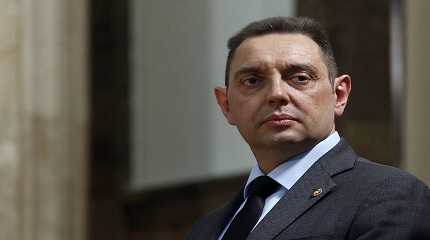
BELGRADE, August 24. /TASS/: Serbia’s Interior Minister Aleksandar Vulin has asked US Ambassador to Belgrade Christopher Hill to abide by about the rules of decency and avoid treating Serbs like Indians on a reservation. Serbia’s Interior Ministry released Vulin's statement on Wednesday.
"I do not know what Ambassador Hill wished to achieve by commenting on actions by the government ministers of Serbia, of which he is a guest, but I know that the Serbian ambassador to the United States would never comment on actions by government ministers in Washington. Ambassador Hill thinks he can to force us to do anything he wants, as if we were Comanches on a reservation," Vulin said, commenting on an interview with the US diplomat on Serbia’s channel N-1.
"I do not know what Ambassador Hill hopes to achieve by urging us to recognize Kosovo, but it seems to me that he himself does not know what he wants to achieve. Maybe the ambassador will manage to have me removed from the [new] government, but he will not succeed in destroying the idea of independent Serbia, which makes its own decisions," Vulin said.
Earlier, Hill speaking in an interview with N1 (CNN's subsidiary in the Balkans), strongly condemned Vulin's recent visit to Moscow, and also pointed out Serbia should impose sanctions on Russia and "join the burden" shared by many other members of the EU.
On August 22-23, Vulin paid a visit to Russia, where he met with Deputy Defense Minister Alexander Fomin, Foreign Minister Sergey Lavrov, and Security Council Secretary Nikolay Patrushev. During the talks, serious attention was paid to the crisis in Kosovo and Metohija.
On July 31, the situation in Kosovo and Metohija worsened sharply after the police of the unrecognized entity closed the checkpoint on the administrative line with Serbia, intending to introduce migration cards for Serbs residing in the region starting from August 1, and also demanding the re-registration of Serbian cars. In response, Serbs in the northern part of Kosovo took to the streets to demonstrate and block the main highways. Sirens were sounded in a number of cities in the north of the region. Police and members of the international security force in Kosovo (KFOR), operating under the auspices of NATO, were moved to the bridge over the Ibar River, connecting the north and the south of Kosovska Mitrovica. As a result of international efforts Pristina postponed the introduction of migration cards and the ban on Serbian license plates till 1 September.




